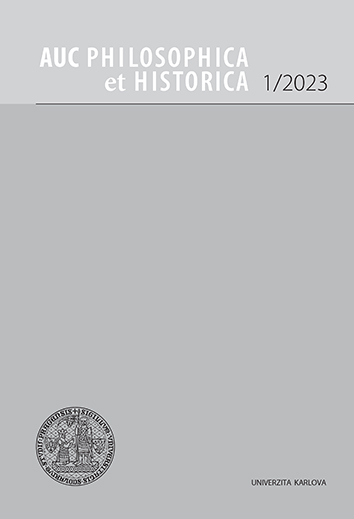AUC Philosophica et Historica (Acta Universitatis Carolinae Philosophica et Historica) is a multidisciplinary academic journal focused on the humanities with more than 50 years of tradition.
The journal is indexed in CEEOL, DOAJ, and EBSCO.
AUC PHILOSOPHICA ET HISTORICA, Vol 2018 No 2 (2018), 9–22
Recidivism as a Measure of the Effectiveness of Sanctions: Experience from the Czech Republic
Jan Tomášek, Jan Rozum
DOI: https://doi.org/10.14712/24647055.2018.1
published online: 18. 04. 2018
abstract
Recidivism is one of the measures that can be used to evaluate the effectiveness of sanctions imposed by the criminal justice system. The article summarizes findings from the most extensive research of this type in the Czech Republic. The sample included a total of 4,233 individuals sentenced to house arrest, community service, suspended sentences with supervision or released from prison in 2012. Recidivism was defined as a new record in the Criminal Register in 2014. It was revealed that 48.1% of the sample re-offended in the two year period. While the type of sanction imposed on the offender had a negligible impact, the likelihood of a new conviction was strongly linked to gender, age and previous criminal career. The significance of previous convictions and their number was confirmed also by the multivariate analysis using logistic regression. The importance of these findings is high and the recidivism should be monitored systematically in the Czech Republic. However, as the research showed, it is impossible to connect the effectiveness of crime control with simply finding “effective sanctions”. Inevitably, the criminal policy must be understood as an integral part of social policy.
keywords: Recidivism; effectiveness of penal policy; alternatives to prison; criminal carreer
references (21)
1. Bushway, S., Brame, R., & Paternoster, R. (2004). Connecting desistance and recidivism: measuring changes in criminality over the lifespan. In Maruna, S., & Immarigeon, R. After Crime and Punishment: Pathways to Offender Reintegration. (pp. 85–101). Cullompton: Willan Publishing.
2. Farrington, D. (2008). Integrated developmental and life-course theories on offending. London: Transaction Publishers.
3. Farrington, D., Coid, J., & Harnett, L. (2006). Criminal careers up to age 50 and life success up to age 48: new findings from the Cambridge Study in Delinquent Development. London: Home Office.
4. Gřivna, T., Scheinost, M., & Zoubková, I. (2014). Kriminologie. Praha: Wolters Kluwer.
5. Israel, M., & Chui, W. H. (2006). If 'something works' is the answer, what is the question? Supporting pluralist evaluation in community corrections in the United Kingdom. European Journal of Criminology, 3(2), 181–200. CrossRef
6. King, S. (2014). Desistance transitions and the impact of probation. London: Routledge.
7. Kubrin, C., Stucky, T., & Krohn, M. (2009). Researching Theories of Crime and Deviance. Oxford: Oxford University Press.
8. Langan, P., & Levin, D. (2002). Recidivism of Prisoners Released in 1994. Federal Sentencing Reporter, 15(1), 58–65. CrossRef
9. Lloyd, C., Mair, G., & Hough, M. (1994). Explaining reconviction rate: A critical analysis. London: Home Office.
10. Marešová, A., Blatníková, Š., Kotulan, P., Martinková, M., Štěchová, M., & Tamchyna, M. (2011). Kriminální recidiva a recidivisté: charakteristika, projevy, možnosti trestní justice. Praha: IKSP.
11. McNeill, F. (2000). Defining effective probation: frontline perspectives. The Howard Journal of Criminal Justice, 39(4), 382–397. CrossRef
12. Merrington, S., & Stanley, S. (2007). Effectiveness: who counts what?. In Gelsthorpe, L., & Morgan, R. Handbook of Probation. (pp. 428–458). Cullompton: Willan Publishing. Newburn, T. (2007). Criminology. Cullompton: Willan Publishing.
13. Novotný, O., & Zapletal, J. (2001). Kriminologie. Praha: Eurolex Bohemia.
14. Roberts, J., & Hough, M. (2005). Understanding public attitudes to criminal justice. Maidenhead: Open University Press.
15. Rozum, J., Kotulan, P., Luptáková, M., Scheinost, M., Tomášek, J., & Špejra, M. (2010). Uplatnění mediace v systému trestní justice II. Praha: IKSP.
16. Rozum, J., Kotulan, P., Špejra, M., & Tomášek, J. (2011). Probační programy pro mladistvé. Praha: IKSP. Rozum, J., Kotulan, P., & Tomášek, J. (2008). Účinnost dohledu u osob podmíněně propuštěných. Praha: IKSP.
17. SCCJR. (2012). Reducing Reoffending: Review of Selected Countries. Glasgow: The Scottish Centre for Crime and Justice Research.
18. Scheinost, M., Háková, L., Rozum, J., Tomášek, J., & Vlach, J. (2014). Sankční politika pohledem praxe. Praha: Institut pro kriminologii a sociální prevenci.
19. Scheinost, M., Rozum, J., Háková, L., Tomášek, J., & Vlach, J. (2015). Trestní sankce – uplatňování, mediální prezentace a recidiva. Praha: IKSP.
20. Soothill, K., Fitzpatrick, C., & Francie, B. (2009). Understanding Criminal Careers. Cullompton: Willan Publishing.
21. Tomášek, J. (2010). Úvod do kriminologie – jak studovat zločin. Praha: Grada.

Recidivism as a Measure of the Effectiveness of Sanctions: Experience from the Czech Republic is licensed under a Creative Commons Attribution 4.0 International License.
